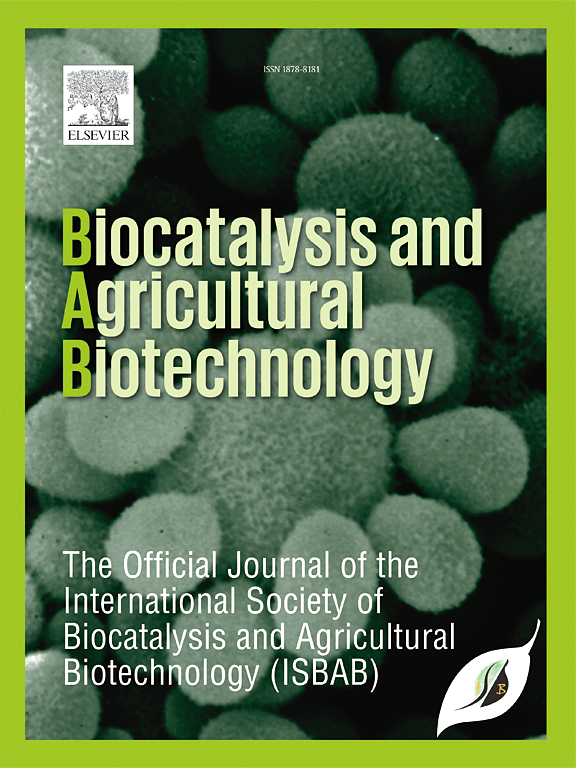Nanoparticle-based strategies for enhancing faba bean (Vicia faba L.) growth and stress tolerance in saline soils
IF 3.4
Q2 BIOTECHNOLOGY & APPLIED MICROBIOLOGY
引用次数: 0
Abstract
Nanotechnology is increasingly being explored for agricultural applications, particularly in the development of advanced nano-fertilizers and their integration into innovative farming practices. Salinity stress is a major constraint affecting faba bean growth, leading to reduced biomass accumulation and diminished yield. This study carried out in a split-plot design to examine the impact of various nanoparticle treatments, nitrogen-phosphorus-potassium nanoparticles (NPK-NPs) applied individually or in combination with K-silicate, chemically synthesized silica nanoparticles (SiO2NPs), and biologically synthesized silica nanoparticles (Myco-SiO2NPs), on the growth and physiological responses of faba bean plants grown in saline soil conditions. The characterization of the synthesized nanoparticles confirmed their nanoscale structure, with mean diameters of 57.1 nm for Myco-SiO2NPs, 48.9 nm for chemically synthesized SiO2NPs, and 31.7 nm for NPK-NPs. The application of Myco-SiO2NPs significantly enhanced antioxidant enzyme activities, including catalase (CAT), superoxide dismutase (SOD), and polyphenol oxidase (PPO), thereby improving oxidative stress management in plants. Furthermore, the application of nanoparticle treatments—particularly SiO2NPs—markedly increased both shoot and seed yields, with improvements of 85.3 % and 85.2 % respectively when applied alone. These enhancements were further amplified by the addition of Nano-NPK, yielding increases of 108.5 % for shoots and 91.2 % for seeds. Nutrient uptake, including nitrogen, phosphorus, and potassium, improved notably under nanoparticle and Nano-NPK treatments. These findings underscore the promise of nanoparticle-based solutions, notably the synergy between NPK-NPs and SiO2NPs, for improving growth performance and productivity in crops affected by salinity stress.
基于纳米颗粒的盐碱地蚕豆生长和抗逆性策略
纳米技术越来越多地被用于农业应用,特别是在开发先进的纳米肥料和将其整合到创新的农业实践中。盐胁迫是影响蚕豆生长的主要制约因素,导致生物量积累减少,产量下降。本研究采用裂图设计,研究了不同纳米颗粒处理(氮磷钾纳米颗粒(NPK-NPs)单独施用或与钾硅酸盐、化学合成二氧化硅纳米颗粒(SiO2NPs)和生物合成二氧化硅纳米颗粒(Myco-SiO2NPs)联合施用)对盐碱地条件下蚕豆植物生长和生理反应的影响。合成的纳米颗粒的表征证实了其纳米级结构,Myco-SiO2NPs的平均直径为57.1 nm,化学合成的SiO2NPs的平均直径为48.9 nm, NPK-NPs的平均直径为31.7 nm。应用Myco-SiO2NPs可显著提高植物过氧化氢酶(CAT)、超氧化物歧化酶(SOD)和多酚氧化酶(PPO)等抗氧化酶活性,从而改善植物的氧化胁迫管理。此外,纳米颗粒处理的应用-特别是sio2 - nps -显著提高了茎和种子产量,单独施用时分别提高了85.3%和85.2%。添加纳米氮磷钾进一步增强了这些增强,芽产量增加108.5%,种子产量增加91.2%。在纳米颗粒和纳米npk处理下,氮、磷、钾等养分吸收显著提高。这些发现强调了基于纳米粒子的解决方案的前景,特别是NPK-NPs和SiO2NPs之间的协同作用,可以改善受盐胁迫影响的作物的生长性能和生产力。
本文章由计算机程序翻译,如有差异,请以英文原文为准。
求助全文
约1分钟内获得全文
求助全文
来源期刊

Biocatalysis and agricultural biotechnology
Agricultural and Biological Sciences-Agronomy and Crop Science
CiteScore
7.70
自引率
2.50%
发文量
308
审稿时长
48 days
期刊介绍:
Biocatalysis and Agricultural Biotechnology is the official journal of the International Society of Biocatalysis and Agricultural Biotechnology (ISBAB). The journal publishes high quality articles especially in the science and technology of biocatalysis, bioprocesses, agricultural biotechnology, biomedical biotechnology, and, if appropriate, from other related areas of biotechnology. The journal will publish peer-reviewed basic and applied research papers, authoritative reviews, and feature articles. The scope of the journal encompasses the research, industrial, and commercial aspects of biotechnology, including the areas of: biocatalysis; bioprocesses; food and agriculture; genetic engineering; molecular biology; healthcare and pharmaceuticals; biofuels; genomics; nanotechnology; environment and biodiversity; and bioremediation.
 求助内容:
求助内容: 应助结果提醒方式:
应助结果提醒方式:


